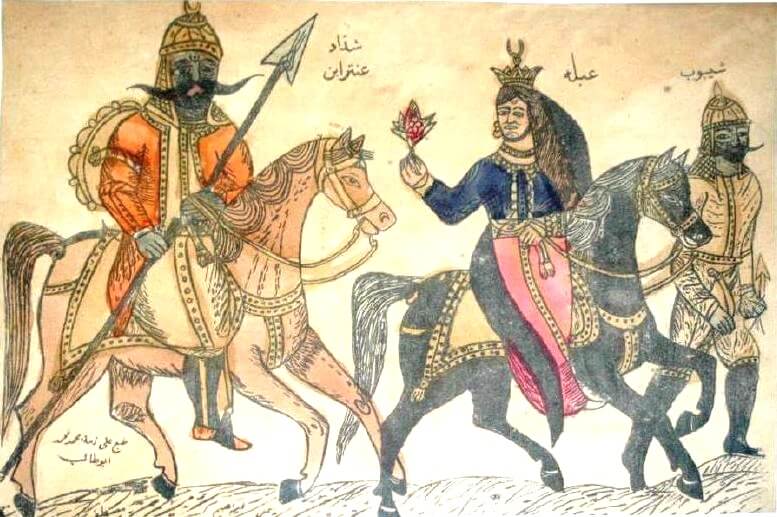The Most Iconic Love Stories in the Arab Heritage
أشْهَر قِصَص الحُب في التراث العَرَبي

عَنْترَة و عَبْلَة
Antarah and Abla
Antarah bin Shaddad is one of the most famous Arab poets ( شُعَراء ) ever. He lived in the period before Islam. He was famous for his courage in battle ( مَعْرَكة ) and his strength in horsemanship( فُروسِيّة ).
After showcasing a great heroism and saving his tribe from an invasion, Antarah earned his freedom from slavery. Therefore, he had the courage to ask his uncle to marry his cousin Abla. Her dowry(مَهْر) had him go through impossible tasks which he accomplished bravely.
The researchers ( الباحِثون ) had different versions about the end of the lover’s story. Some of them believed that Antarah married and won Abla at the end, and some believed that Abla’s father and brother stood in the way of the lovers because of Antarah’s history of slavery. What we are sure about is that their love story resulted in some the most eloquent and beautiful Arabic poetry ever written.
قْيْس و ليلى
Qais and Laila
Qais Ibn Almolawah is considered one of the greatest ( أعْظَم ) Arab poets who lived in the first Hijri century. He is known for his love poetryشِعْر الغَزَل for his beloved Laila.
Both lovers were born to the same tribe, Banu Amir بنو أمير, and since childhood, the two have grown to admire one another and the feelings they had gradually developed into love. However, in their adulthood, when Qais proposed to her father, the latter refused. Qais became obsessed with Laila so much so that he was dubbed by his tribal community “ Majnun Laila مجنون ليلى , which means “The One Who is Insane About Laila”. To this day, Majnun Laila is a synonym for someone who is madly in love with a woman.
He was not crazy (مَجْنون ) but his intense ( شَديد )love for Laila is the reason for this name, as his love exceeded (تَجاوَزَ )all limits, and became a perfect example for lovers (عُشّاق ).
According to some resources in the Arab heritage ( التُراث العربي ) , the reason behind the marriage refusal is the animosity between the two lovers’ families.
Devastated by their refusal, Qais went alone to live in the desert .الصَّحَراء While Qais he was there, Laila married another person, but her love for Qais remained in her heart( قَلْب ). So she thought of escaping ( الهُروب )) to the desert to be with her lover( حَبيب ) in his loneliness وِحْدة )) . It was said that Laila met ( قابَلَتْ ) him in the desert after her husband’s death( مَوْت ), and after a while ( فَتْرة ) Laila died, then Qais died too and death finally united( وَحَّدَ ) the two lovers.
The impact ( تَأثير ) of Qais and Laila story on literature ( الأدَب ) :
Qais’s poetry influenced (أثَّرَ ) Persian الفارِسيّ )) , Indian( الهِنْدِيّ ), Turkish التُّرْكيّ )) and Urdu ( الأُرْدويّ ) literature. His story was one of the five stories قِصَص )) mentioned in the Persian poet ( شاعِر ) Nizami Ganjavi’s book the Five Treasures( الكُنوز الخَمْسة ).
جَميل و بُثَيْنَة
Jameel and Bothayna
As a camel shepherd (راعي ) , Jameel was guiding his herd to a nearby field. There, he found a water source and while one of his camels was drinking, another of Bothina’s came and scared that of Jameel. Jameel got angry and cursed Bothina; she replied with a curse of her own. Jameel liked her rebellious (مُتَمَرِّد) character and instantly fell in love with her; she too had some feelings for him, and he asked her father for her hand in marriage. Her father refused and quickly married her to a another man. Jameel was heartbroken and escaped to Yemen, when he returned to the Arabian Island years later looking for his loved one, he found out her family moved to the Levant (الشام). The young lover never got to see her again, but he immortalized her in his poetry.
He became one of the most prominent( بارِز ) Arabic poets who were famous for their eloquence( فَصاحة ). His eloquence combines the novel ( رُواية ) with poetry (شِعْر), he has many( عَديدة ) verses that when we read them we feel( نَشْعُرُ ) as if they express what is in our hearts( قُلوب ).



 Next Post
Next Post



